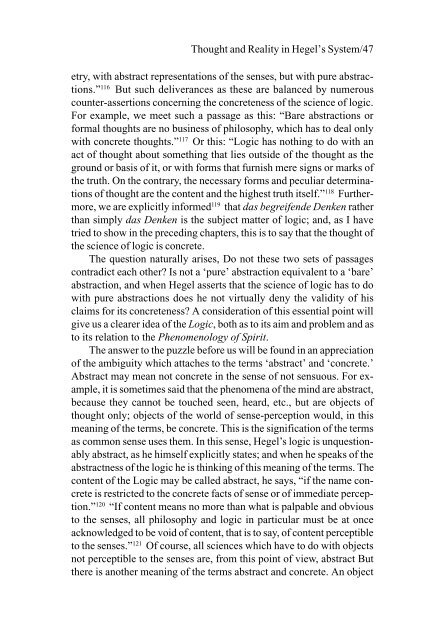Thought and Reality in Hegel's System
Thought and Reality in Hegel's System
Thought and Reality in Hegel's System
- No tags were found...
You also want an ePaper? Increase the reach of your titles
YUMPU automatically turns print PDFs into web optimized ePapers that Google loves.
<strong>Thought</strong> <strong>and</strong> <strong>Reality</strong> <strong>in</strong> Hegel’s <strong>System</strong>/47etry, with abstract representations of the senses, but with pure abstractions.”116 But such deliverances as these are balanced by numerouscounter-assertions concern<strong>in</strong>g the concreteness of the science of logic.For example, we meet such a passage as this: “Bare abstractions orformal thoughts are no bus<strong>in</strong>ess of philosophy, which has to deal onlywith concrete thoughts.” 117 Or this: “Logic has noth<strong>in</strong>g to do with anact of thought about someth<strong>in</strong>g that lies outside of the thought as theground or basis of it, or with forms that furnish mere signs or marks ofthe truth. On the contrary, the necessary forms <strong>and</strong> peculiar determ<strong>in</strong>ationsof thought are the content <strong>and</strong> the highest truth itself.” 118 Furthermore,we are explicitly <strong>in</strong>formed 119 that das begreifende Denken ratherthan simply das Denken is the subject matter of logic; <strong>and</strong>, as I havetried to show <strong>in</strong> the preced<strong>in</strong>g chapters, this is to say that the thought ofthe science of logic is concrete.The question naturally arises, Do not these two sets of passagescontradict each other? Is not a ‘pure’ abstraction equivalent to a ‘bare’abstraction, <strong>and</strong> when Hegel asserts that the science of logic has to dowith pure abstractions does he not virtually deny the validity of hisclaims for its concreteness? A consideration of this essential po<strong>in</strong>t willgive us a clearer idea of the Logic, both as to its aim <strong>and</strong> problem <strong>and</strong> asto its relation to the Phenomenology of Spirit.The answer to the puzzle before us will be found <strong>in</strong> an appreciationof the ambiguity which attaches to the terms ‘abstract’ <strong>and</strong> ‘concrete.’Abstract may mean not concrete <strong>in</strong> the sense of not sensuous. For example,it is sometimes said that the phenomena of the m<strong>in</strong>d are abstract,because they cannot be touched seen, heard, etc., but are objects ofthought only; objects of the world of sense-perception would, <strong>in</strong> thismean<strong>in</strong>g of the terms, be concrete. This is the signification of the termsas common sense uses them. In this sense, Hegel’s logic is unquestionablyabstract, as he himself explicitly states; <strong>and</strong> when he speaks of theabstractness of the logic he is th<strong>in</strong>k<strong>in</strong>g of this mean<strong>in</strong>g of the terms. Thecontent of the Logic may be called abstract, he says, “if the name concreteis restricted to the concrete facts of sense or of immediate perception.”120 “If content means no more than what is palpable <strong>and</strong> obviousto the senses, all philosophy <strong>and</strong> logic <strong>in</strong> particular must be at onceacknowledged to be void of content, that is to say, of content perceptibleto the senses.” 121 Of course, all sciences which have to do with objectsnot perceptible to the senses are, from this po<strong>in</strong>t of view, abstract Butthere is another mean<strong>in</strong>g of the terms abstract <strong>and</strong> concrete. An object
















